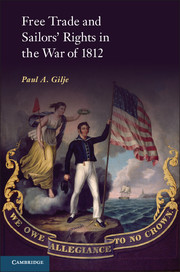2 - The Revolutionary Experience
Published online by Cambridge University Press: 05 March 2013
Summary
Revolutionary Americans seized upon the enlightened concept of free trade in its varied and overlapping meanings and the new approach to diplomacy to make them their own. The different uses of free trade spiraling around the Atlantic world before 1775 continued to swirl and interact in the minds of many Americans after the war broke out and during the opening years of the early republic. This interest in free trade arose despite a resistance movement that had advocated boycotts to oppose British imperial regulation and the debate over market controls during the resistance movement and the war. If anything, support for free trade became more intense as Americans discussed how to organize a domestic market economy within the new states, and proclaimed the benefits of free and open commerce for a republican and revolutionary order in international relations. In the minds of most Americans, free trade and enlightened diplomacy became identified with their Revolution.
Use of the phrase “free trade” as an unregulated transaction in a free market appeared in debates over price regulations during the Revolutionary War. Faced with inflation and skyrocketing prices, the Continental Congress waffled on the issue of a free market. Sometimes Congress endorsed price regulation; at other times Congress reversed itself. On April 8, 1778, Congress encouraged the states to set prices, but it then abandoned this position in June, determining that such efforts “are not only ineffectual,” but also “productive of very evil Consequences to the great Detriment of the public Service and greivous Oppression of Individuals.” There were also a number of regional conventions of states that sought to stem inflation and set prices, and several states passed harsh legislation to enforce price scales, threatening legal action against violators. Increased demands for supplies by the military of all belligerents – American farmers fed the Continental, French, and British armies – and the failure of every state to establish price controls doomed these efforts. For example, when Connecticut passed draconian price regulation, neighboring Massachusetts did not, compelling Connecticut to repeal its law.
- Type
- Chapter
- Information
- Free Trade and Sailors' Rights in the War of 1812 , pp. 32 - 45Publisher: Cambridge University PressPrint publication year: 2013



